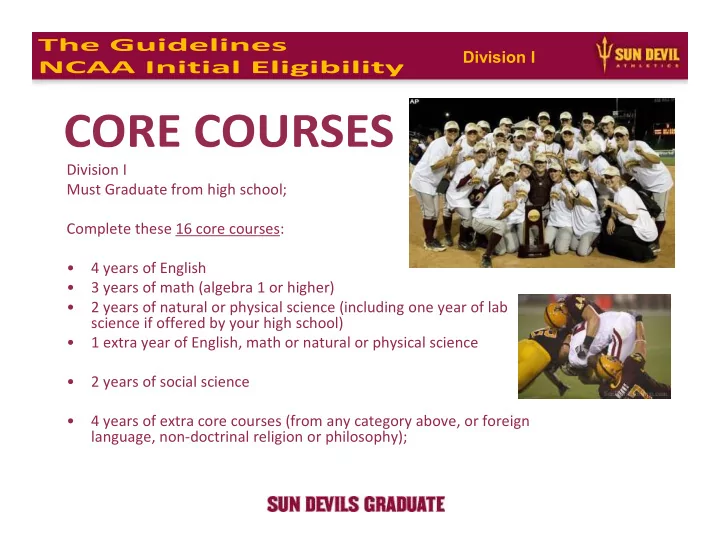

���������� Division I Must Graduate from high school; Complete these 16 core courses: • 4 years of English • 3 years of math (algebra 1 or higher) • 2 years of natural or physical science (including one year of lab science if offered by your high school) • 1 extra year of English, math or natural or physical science • 2 years of social science • 4 years of extra core courses (from any category above, or foreign language, non-doctrinal religion or philosophy);
NEW Requirements For students enrolling full time at an NCAA Division I college or university on or after August 1, 2015 , there are three possible academic outcomes: � Full qualifier = competition, athletics aid (scholarship), and practice the first year. � Academic redshirt = athletics aid the first year, practice in first regular academic term (semester or quarter). � Non-qualifier = no athletics aid, practice or competition the first year.
Initial-Eligibility Standards NCAA SLIDING SCALE IS CHANGING! The standard for immediate access to competition will become MINIMUM OF 2.3 GPA and an increased sliding scale. • Specifically, incoming student-athletes would need to earn a half-point higher GPA for a given test score compared to the current standard. – For example, an SAT score of 1000 would require a 2.5 high school core-course GPA for competition (CURRENTLY 2.50 requires 820) �������������������������������������������������������������������� �����������������������
Initial-Eligibility Standards Student-athletes who achieve the current minimum initial- eligibility standard on the test score-grade-point average sliding scale with at least a minimum 2.0 core-course GPA would continue to be eligible for athletically related financial aid during the first year of enrollment and practice during the first regular academic term of enrollment. • Student-athletes could earn the second term of enrollment for practice by passing nine semester or eight quarter hours. • APPROXIMATELY 15% of 2011 entering student-athletes would have been ineligible for competition
Core Course Requirements: • Prospects will be required to successfully complete 10 of the 16 total required core courses before the start of their senior year in high school. • Seven of the 10 courses must be successfully completed in English, math and science . • These core courses (and grades) must be used in calculating the core GPA for purposes of meeting the sliding scale and GPA minimum. �������������������������������������������������������������������� �����������������������
Abbreviated Sliding Scales
NCAA CORE GPA SAT ACT CURRENT SCALE: 2.500 820 68 NEW SCALE: 2.500 1000 85 Complete NEW sliding scale will be released in January
Summary of Changes • Minimum 2.300 core-course GPA required for competition; • Significant changes in GPA/test score index (sliding scale); and • Ten core courses required before beginning of senior year.
Role of the high school Counsel PSAs to take four-year college preparatory classes – 9th grade counts! – Look at your list of NCAA courses as a guide for PSAs Familiarity with NCAA rules – Team with coaches and athletics administrators • Encourage coaches to work with PSAs to register during sophomore year – Guide for the College-Bound Student-Athlete publication • DI and DII worksheets in Guide can help with planning
Role of the prospective student-athlete (PSA) • Academic focus through high school – 9 th grade counts! – Completion of four-year college preparatory courses – Consistent progress through high school • Register with the NCAA Eligibility Center – Beginning of Sophomore year – www.eligibilitycenter.org • Take SAT/ACT – Register for test(s) with 9999 code to send scores to EC – Test scores reported on transcripts cannot be used – High school personnel sends transcript(s) to EC preferably after 6 th semester of all registered students – On/after April 1, of senior year, finalize amateurism status
Nontraditional Courses • Courses taught via Internet, correspondence, software- based credit recovery, independent study, individualized instruction – Have ongoing student/teacher access and interaction for teaching, evaluating, providing assistance – Have a defined timeframe for completion (minimum and maximum) – Student work available for evaluation/validation – Meet all requirements for a core course
OBSERVATIONS • Guidance Counselor’s knowledge of Initial Eligibility rules VARY GREATLY • Some student-athletes are getting LATE START • NCAA “cracking down” on ONLINE recovery programs • Document, Document, Document! • Education sessions for parents, guidance counselors and student-athletes A MUST • Systematic approach to identifying “college” level talent and plans must start earlier
Two-Year College Transfer Student-Athletes � �������������������������������������������������������������� ��� � ���������������������������������������������������������������� � � ��!��������������������"������������������������������������ ��������������#�������$%&'������$(&�������������$(& � )��������������������������������������������������������������� ������������������)��������*���������� �������������������������������������������������������������������� �����������������������
Recommend
More recommend